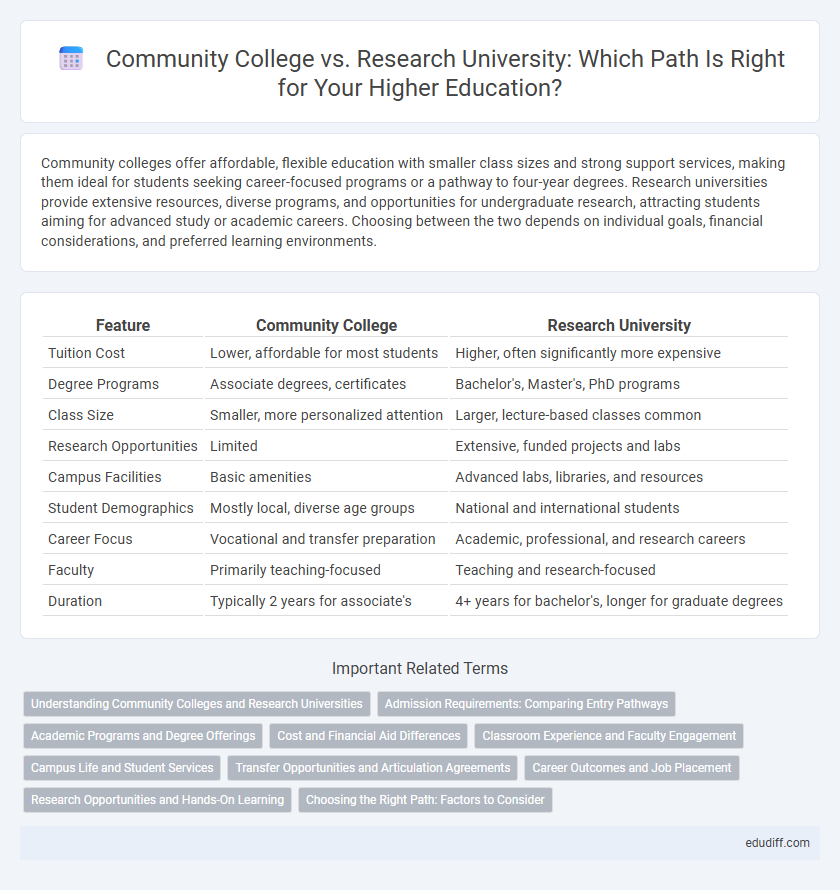Community colleges offer affordable, flexible education with smaller class sizes and strong support services, making them ideal for students seeking career-focused programs or a pathway to four-year degrees. Research universities provide extensive resources, diverse programs, and opportunities for undergraduate research, attracting students aiming for advanced study or academic careers. Choosing between the two depends on individual goals, financial considerations, and preferred learning environments.
Table of Comparison
| Feature | Community College | Research University |
|---|---|---|
| Tuition Cost | Lower, affordable for most students | Higher, often significantly more expensive |
| Degree Programs | Associate degrees, certificates | Bachelor's, Master's, PhD programs |
| Class Size | Smaller, more personalized attention | Larger, lecture-based classes common |
| Research Opportunities | Limited | Extensive, funded projects and labs |
| Campus Facilities | Basic amenities | Advanced labs, libraries, and resources |
| Student Demographics | Mostly local, diverse age groups | National and international students |
| Career Focus | Vocational and transfer preparation | Academic, professional, and research careers |
| Faculty | Primarily teaching-focused | Teaching and research-focused |
| Duration | Typically 2 years for associate's | 4+ years for bachelor's, longer for graduate degrees |
Understanding Community Colleges and Research Universities
Community colleges provide accessible, affordable education focused on associate degrees, certifications, and transfer opportunities, serving diverse student populations and emphasizing workforce readiness. Research universities emphasize advanced degree programs and generate knowledge through extensive research activities, often partnering with industries to advance innovation. Understanding the distinct missions, resources, and outcomes of both institution types aids students in making informed decisions aligned with their academic and career goals.
Admission Requirements: Comparing Entry Pathways
Community colleges typically offer open admission policies requiring a high school diploma or equivalent, making them accessible for a wide range of students. Research universities often have more competitive admission criteria, including higher GPA thresholds, standardized test scores, and rigorous application materials. These differing entry pathways reflect varied academic expectations and institutional missions.
Academic Programs and Degree Offerings
Community colleges provide a wide range of associate degrees and certificates tailored for workforce readiness and transfer to four-year universities, emphasizing practical skills and foundational coursework. Research universities offer diverse undergraduate, graduate, and doctoral programs with strong emphases on advanced research opportunities, specialized academic fields, and comprehensive theoretical study. The availability of interdisciplinary programs and access to faculty-led research projects distinguishes research universities from community colleges in academic and degree offerings.
Cost and Financial Aid Differences
Community colleges offer significantly lower tuition rates compared to research universities, making them more accessible for students with budget constraints. Financial aid at community colleges primarily includes state grants and federal aid focused on tuition support, while research universities provide a broader range of scholarships, grants, and assistantships tied to academic performance and research involvement. The cost difference often leads students to begin at community colleges before transferring to research universities to maximize financial aid options and reduce overall debt.
Classroom Experience and Faculty Engagement
Community colleges typically offer smaller class sizes that foster personalized interactions and active participation, enhancing the classroom experience for students. Faculty at community colleges often prioritize teaching and are more accessible for mentorship and individualized support. In contrast, research universities may have larger lectures with limited direct faculty engagement, as professors balance teaching with extensive research commitments.
Campus Life and Student Services
Community colleges often provide a close-knit campus environment with smaller class sizes fostering personalized student interactions, while research universities offer a larger, more diverse campus ecosystem with extensive extracurricular opportunities and specialized facilities. Student services at community colleges prioritize academic advising, career counseling, and transfer support tailored to commuter students, whereas research universities feature comprehensive resources including research mentorship, mental health services, and global study programs. Campus life at research universities typically includes vibrant student organizations, athletic teams, and cultural events that enhance social engagement compared to the more task-focused atmosphere of community colleges.
Transfer Opportunities and Articulation Agreements
Community colleges often have extensive articulation agreements with research universities, facilitating seamless transfer pathways that guarantee credit acceptance and reduce time to degree completion. These agreements are designed to align curricula, ensuring that coursework completed at a community college meets the requirements of the research university's programs. Transfer opportunities through these partnerships provide students with cost-effective options and increased accessibility to advanced academic resources and research facilities.
Career Outcomes and Job Placement
Community colleges offer cost-effective, skills-focused programs that lead to quicker entry into the workforce, with strong job placement services tailored to local industry needs. Research universities provide extensive networking opportunities, internships, and advanced degrees, enhancing career advancement and higher earning potential in specialized fields. Data shows graduates from research universities tend to have higher median salaries, while community college graduates benefit from faster employment rates in trades and technical careers.
Research Opportunities and Hands-On Learning
Community colleges emphasize hands-on learning through practical coursework and internships, providing students with immediate skill application. Research universities offer extensive research opportunities, enabling students to engage in advanced projects under faculty mentorship. Access to cutting-edge laboratories and funding at research universities significantly enhances experiential learning and innovation.
Choosing the Right Path: Factors to Consider
Evaluating factors such as program specialization, campus resources, and career goals is crucial when choosing between a community college and a research university. Community colleges often provide affordable, flexible pathways with strong vocational training, while research universities offer extensive research opportunities, diverse academic programs, and access to cutting-edge facilities. Prospective students should also consider class sizes, faculty expertise, and transfer agreements to ensure alignment with their educational and professional aspirations.
Community College vs Research University Infographic

 edudiff.com
edudiff.com